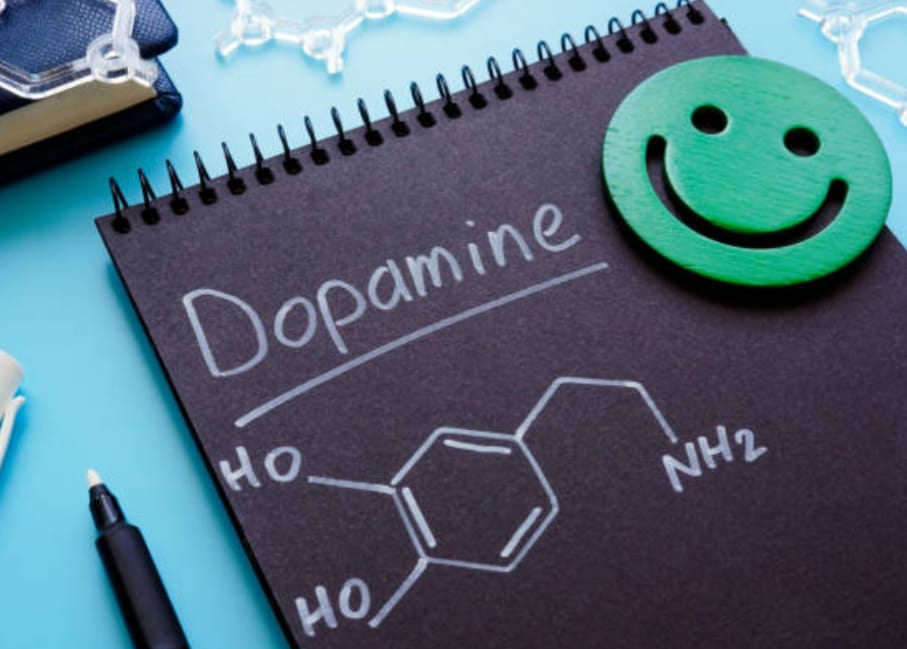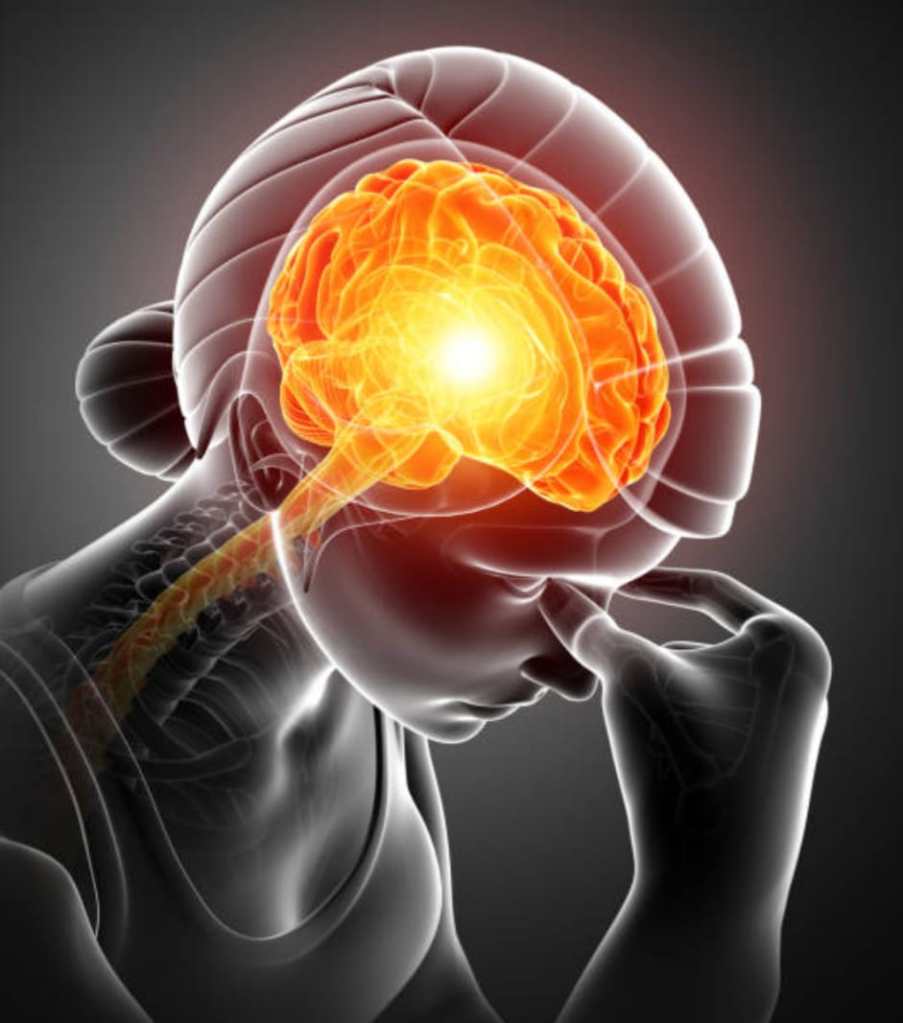If you are always curious about what is going on in your head.
Why am I feeling stressed or driven all of a sudden?
How can I keep my rage under control?
What can I do to make myself happy and satisfied?
Why do I have mood swings all the time?
How else can I persuade myself to see things differently?
When will I be completely satisfied?
Why am I usually anxious or sluggish?
Are there any additional questions that arise in your mind?
DOPAMINE is one of the reasons for all of these concerns. You may have heard this term in some form or another. But if you want to learn more in-depth, keep reading this post. This blog will provide answers to any queries you may have.

- What is Dopamine and How Does it Impact Our Lives?
- How Dopamine makes you feel
- The Role of Dopamine in Mental Health & Well-Being
- How to Increase Your Dopamine Levels Naturally
- The Pros & Cons of Taking Supplements to Boost Your Dopamine Levels
- Take Away
What is Dopamine and How Does it Impact Our Lives?
The neurotransmitter associated with pleasure and reward is dopamine. When we complete a task, it facilitates a sense of satisfaction, fulfillment, and accomplishment. It fosters healthy behaviors and encourages performance. Dopamine is produced by neurons in the area near the base of the brain in two steps. First, tyrosine is transformed into L-dopa, a different amino acid. Then, as enzymes convert L-dopa into dopamine, another transformation occurs. Dopamine and other neurotransmitters are likely to assist the chemical messengers that keep us focused and alert.
Particularly dopamine appears to have a biological link to motivation, concentration, and resilience. According to Huberman Lab research at Stanford University, dopamine, a chemical messenger in our brain, has the power to greatly enhance our ability to think creatively, maintain concentration, and accomplish tasks. Dopamine would increase resilience by encouraging help-seeking, determination in the face of difficulties, and a positive outlook on carrying out tasks.
How Dopamine makes you feel
Dopamine tends to assist us to access our self-confidence, reason, self-awareness, and critical thinking, helping us know exactly what we want and how to obtain it. Dopamine also improves our strategic thinking, masterminding, innovating, problem-solving, imagining, and pragmatism, which helps us focus intensively on the work at hand and feel joy in accomplishment. Compared to other people, we could feel extremely alert or require less sleep. Additionally, dopamine appears to facilitate the following actions:
• Pleasure and reward centers.
• Learning and focus.
• Sleep and uniformity and consistency.
• Cognition and behavior.
• Physical activity and emotions.
• Self-motivation, encouragement, and reward.
The Role of Dopamine in Mental Health & Well-Being
In other words, mounting data suggests that we frequently repeat actions that release dopamine. Conversely, low dopamine is linked to depressive symptoms such as despair and thoughts of worthlessness and hopelessness. The fact that dopamine might also contribute to addictive behaviors may therefore be the bad news.
A lack of dopamine can affect our capacity to control stress, concentrate, finish tasks, and stay motivated. Self-isolation and destructive ideas and actions are further drawbacks. Researchers have discovered that hand tremors, sluggishness of movement, and even pre-symptoms of Parkinson’s can be caused by low dopamine levels or inadequate dopamine signaling over the long term.
Dopamine starts to work before we receive rewards. This is significant because it implies that its primary function is to motivate us to take action, either to accomplish something positive or to prevent something negative. Dopamine essentially influences how our brain determines whether a goal is even worthwhile to pursue in the first place. Dopamine is released when our brain determines that a significant event is going to occur.
Dopamine levels rise at times of intense stress, according to researchers. It was shown that individuals who were willing to put in the extra effort had higher dopamine levels in the prefrontal cortex and striatum, two regions known to affect motivation and reward. Dopamine was found in the anterior insula, a region of the brain associated with emotion and danger perception, in slackers.

The implications of a higher level of dopamine
According to some studies, having too much dopamine can cause reckless driving, shoplifting, violence, and over-controlling of other people, as well as other excessive risk-taking and impulsive behaviors. But a person’s neurobiology, brain structure, and genetics will also have an impact on symptoms. While adequate quantities of dopamine can actually assist some people to maintain their calm, extremely high levels can cause a person to feel anxious and tense within. The list of undesirable effects that could result from elevated dopamine is provided below.
AGITATION: People with high dopamine levels could experience internal restlessness and overstimulation. Long stretches of immobility may be challenging.
ANXIETY: When dopamine levels raise in particular regions of the brain, some people may experience increased anxiety. Dopaminergic receptor deficiency may be the cause of this.
COGNITIVE ACUITY: It causes their mental performance to advance and their intellect to quicken. Other people appear to be moving slowly, while the user is consistently doing at their best.
INSOMNIA: A high dopamine level may make it hard to fall asleep, leading to insomnia.
MANIA: Elevated levels of dopamine may serve as a contributing factor in mania or hypomania. Reduced need for sleep, joy, chattiness, social conduct, and impulsive activity are all signs of mania.
PARANOIA: People who experience paranoia frequently have elevated extracellular dopamine concentrations in their brains. People who suffer from disorders like paranoid schizophrenia and paranoid personality disorder frequently struggle with dopaminergic receptor density.

The implications of dopamine deficiency
Dopamine is broken down during stressful situations to create stress hormones like oxytocin. Multiple instances of extreme stress can gradually reduce dopamine reserves. In comparison to people who entered the environment when under moderate or low levels of stress, someone who is under a lot of chronic stress (such as demanding job responsibilities or work-family conflict) may be more likely to succumb to an unanticipated unfavorable occurrence, such as the COVID-19 pandemic. It also emphasizes how crucial it is to deal with our stressors early on, whether that be through treatment, regular rest periods, or job design, to prevent them from building up and incapacitating our stress response system. Following Alzheimer’s disease, Parkinson’s disease is the neurological condition with the highest prevalence.
Mental difficulties include distractibility, lack of follow-through, memory loss or amnesia, poor abstract thinking, and slow processing speed can be signs of a dopamine shortage.
ADD/ADHD, decreased alertness, task failure, hyperactivity, impulsive conduct, and poor concentration are all symptoms of attention problems.
Physical problems including poor energy, exhaustion, sluggishness, anemia, balance issues, blood sugar instability, carbohydrate cravings, diminished strength, or digestion or thyroid troubles can all be attributed to a dopamine shortage.
Symptoms of dopamine insufficiency include mood fluctuations, procrastination, self-destructive ideas, aggression, guilt, sadness, hopelessness, worthlessness, guilt, pleasure-seeking behavior, stress intolerance, social isolation, and hostility.
How to Increase Your Dopamine Levels Naturally
Tyrosine is a necessary amino acid for the production of dopamine, thus increasing your intake of it through the diet may help your brain produce more of the chemical. There is proof that a diet high in tyrosine may also enhance mental function and memory
Essential oils
Numerous essential oils, including lavender, lemon, and bergamot, are effective in treating stress, anxiety, depression, and other mood disorders, according to the majority of studies and clinically applied experience. Most significantly, inhaling essential oils can send messages to the nose and encourage the release of neurotransmitters like serotonin and dopamine, which further regulate mood.

Lavender oil seems to promote relaxation and peace, Rosemary oil seems to have anti-depressant and anti-anxiety effects, and Lemon oil seems to increase the body’s production of “feel good” hormones. Essential oils also assist in balancing the dopaminergic system and immune-modulating essential oils like peppermint oil, which has a high menthol concentration and may help relieve high-stress levels, agitation, and dull moods.
Foods To Intake
Dietary Protein
We need to eat enough protein in our diets and have healthy stomach acid and digestive function to give our bodies the raw materials it needs to generate dopamine. Dietary protein is broken down into amino acids when we consume (and digest) it. Tyrosine, an amino acid, is transformed into dopamine through several metabolic processes. Cheese, beef, lamb, pork, fish, poultry, eggs, dairy, whole grain, soy products, turkey, peanuts, almonds, avocados, bananas, milk, yogurt, cottage cheese, lima beans, pumpkin seeds, and sesame seeds are all rich in dietary tyrosine.

Omega 3 fatty acids
Omega 3 polyunsaturated fatty acids in particular aid in raising dopamine levels. Omega 3s helps lessen generalized brain inflammation, which is a factor in anxiety and depression. Fish, vegetable oils, nuts (particularly walnuts), flax seeds, flaxseed oil, and green vegetables are abundant in Omega-3.
Probiotics
Parkinson’s disease (PD), Alzheimer’s disease (AD), and multiple sclerosis (MS) have all been linked to environmental pollutants. Some of them, such as farming, handling pesticides, and heavy metals, which damage dopamine-producing neurons, raise the risk of PD. The gut microbiota must be healthy to treat neurodegenerative illness. Because probiotics contain beneficial or healthy microorganisms, including Lactobacillus, Blautia, Roseburia, Lachnospiraceae, Prevotellaceae, and Akkermansia, they may help ease the symptoms of neurological diseases.
Yogurt, sauerkraut, and spicy kimchi are among the foods that are readily available and high in probiotics that you can incorporate into your daily diet.
Stop eating Junk Foods
According to studies, dopamine system dysfunction is a factor in binge eating disorder (BED). Consuming a lot of high-fat food increases the released dopamine and decreases the uptake of dopamine in the nucleus accumbens. So, in the long run, stay away from unhealthy, high-fat junk food.
Meditation and Exercise
Dopamine levels can be raised spontaneously by aerobic activity. The cortical striatum, which influences motor control, decision-making, and motivation, is made more malleable through exercise. . There is some evidence that when we meditate, the brain releases more dopamine. Its release can be brought on by the shift in consciousness that takes place during meditation.

Stop social Isolation
Increased social engagement, therefore, reduces violent behavior because social isolation can enhance aggressive behavior. According to research, childhood trauma or child abuse can result in schizophrenia. It may sound complicated, but presynaptic dopamine function can be impacted by early trauma. Include fitness, meditation, yoga, massage, engaging with a pet, hiking in nature, or reading a book in your daily routine to keep your dopamine levels regular.
The Pros & Cons of Taking Supplements to Boost Your Dopamine Levels
Drugs that are addictive affect the brain’s reward circuits, even though the brain has evolved to respond to natural rewards like food and sex rather than drugs.
Tyrosine, an amino acid that first turns into L-dopa before turning into the neurotransmitter itself, is a common ingredient in supplements that promise to increase the brain’s ability to produce dopamine.
It’s a frequently asked question whether phenylpiracetam raises dopamine levels in the brain. It has been discovered to improve athletic performance.
What’s Phenylpiracetam?
Dopamine cannot be absorbed back into the brain because phenylpiracetam is an anti-reuptake inhibitor. Along with improving mood and motor coordination, it is thought to increase the density of dopamine, NMDA, and GABA receptors in the brain. The brain-derived neurotrophic factor (BDNF), which promotes the development of new brain cells, may also rise as a result. It also lessens stress and aids in the promotion of sound cognition. It appears to be useful in lessening the severity of the symptoms of ADD and ADHD (Attention deficit hyperactivity disorder), a chronic condition characterized by trouble paying attention, hyperactivity, and impulsivity.
Take Away
These are some of the factors to consider, and understanding the role of dopamine in mental health and well-being is critical to attaining optimal health.
Maintain your optimism, but combine it with realism and embrace, rather than avoid, your anxieties. Having a strong sense of good and wrong gives an attitudinal framework, as does having a strong social support system in which you give to and receive from others. Make physical fitness a priority, and keep your brain sharp by participating in lifelong learning. Finally, attempt to maintain mental flexibility and a healthy sense of humor throughout your life while following a calling, mission, or purpose. And the rest will fall into place on its own.
Related Searches
Innovative Healthcare
Sustainable Living..Healthy Life with zero bucks..


Leave a comment